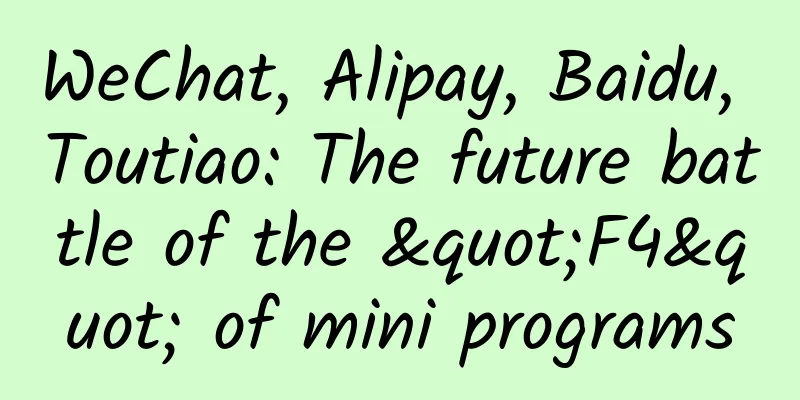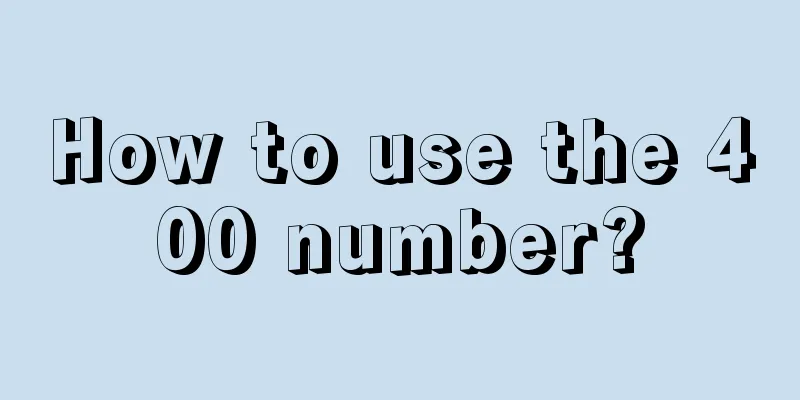WeChat, Alipay, Baidu, Toutiao: The future battle of the "F4" of mini programs

|
People always overestimate the changes in the next one to two years, but underestimate the changes in the next 10 years. This sentence by Mr. Bill Gates, the founder of Microsoft, may be the best annotation of mini programs. Two years ago, when Zhang Xiaolong, the "Father of WeChat", declared that "Mini Programs are the future", entrepreneurs and investors were extremely excited. Mini Programs became popular and millions of developers rushed in with hot money, shouting "ALL-in". However, everything did not go as people predicted. Mini programs have not quickly replaced traditional apps, nor have entrepreneurs reached the pinnacle of their careers, nor have investors made a fortune. On the contrary, although mini programs have created some hits, more mini program developers are facing a brutal reshuffle, with warm "corpses" everywhere.
As a result, developers have fled from mini programs, and investors' enthusiasm has changed from the excitement of "discovering a new track" to the caution of "will it be another pitfall?" By the second half of 2018, mini programs were no longer just a one-man show for WeChat. Giants joined the fray, including Baidu, Alipay, Toutiao and Douyin under Byte Interactive, and others, all of which announced that they would heavily support mini programs and called them one of the most important future strategies. Traffic inclination, huge subsidies, and ecological support... mini programs have once again set off a craze. Why have mini programs become the "future battle" among the giants? The competition for mini programs is obviously not just a simple business competition. What are the giants fighting for behind this PK? The ups and downs of the mini program Entrepreneurs and investors all like to chase trends, and the craze for developing mini programs was once extremely prosperous. In 2017 alone, the number of corporate and individual developers exceeded 1 million, and more than 500,000 mini programs were launched. It should be noted that after years of accumulation, the number of iOS developers in China is only 1.8 million. "15 years ago, you missed out on Taobao, and now you can only watch others making tens of millions a year; 7 years ago, you missed out on WeChat public accounts and social e-commerce, and now you can only watch others making tens of millions a year; so, do you still want to miss out on mini programs?" The madness of mini programs can be seen from the "chicken soup jokes". “Why bother with blockchain? Just start making mini programs!” Investors keep calling out to entrepreneurs. Mini programs have become a new stage that entrepreneurs and investors are fascinated by. With the help of mini programs, many hits have indeed emerged. The first to "explode" is Pinduoduo. An insider of Pinduoduo revealed to reporters that in a very short period of time, Pinduoduo, which was still unknown at the time, attracted 100 million new users with the help of mini programs, and the investment cost was only about 1 million yuan. This brought a great shock to the entire e-commerce industry and gave rise to a wave of WeChat mini program social e-commerce craze. Unlike Pinduoduo and Mobike, which have expanded from APP to mini-programs, Xiangwushuo is a star mini-program that was "native" in the WeChat ecosystem. Xiangwushuo, which is positioned as a "free good things exchange platform", has gained more than 55 million registered users and more than 25 million monthly active users in the 14 months since its establishment. Xiangwushuo is said to have received five rounds of financing, with a cumulative amount of more than 110 million US dollars. These figures have a huge motivational and exemplary effect. However, most entrepreneurs who held the same expectations returned disappointed. In just one year, mini programs have completed a brutal reshuffle. If you compare the WeChat mini program TOP100 in 2007 and the WeChat mini program TOP100 in 2018, you will be surprised to find that these are almost two completely different lists! Less than 10% of the mini programs can remain on the list for two years. According to public media reports and internal data from some institutions, the amount of financing related to mini programs in the first half of 2018 was close to 5 billion yuan, but only 2 billion yuan in the second half. Mini programs are beginning to become "unpopular", with both the number of investments and the amount of investment showing a significant decline compared to the first half of the year. Developer enthusiasm fluctuates over the course of a year. What went wrong? "If you just want to use mini programs as a carrier to do a traffic business, I am not optimistic at all." Zhang Xiaolong, senior vice president of Tencent and president of WeChat Business Group, said at the WeChat Open Class in 2019. "Just because we have traffic, we cannot distribute it and let mini programs reflect the value of traffic. This is completely different from our driving force. Many people don't understand why mini programs need to be decentralized and why they don't have a unified distribution entrance like the APP ecosystem. This is because the mission of mini programs is to allow every creator to reflect value and get rewards." "The 80/20 rule in the traditional APP ecosystem may not apply to mini programs. Whether it is WeChat or mini programs, the concept has always been to serve everyone. Therefore, the growth of mid- and low-end mini programs will be faster, which is also a phenomenon we hope to see." Chen Hao, product manager of WeChat mini programs, said in an interview with China Economic Weekly. Chen Hao said that when the mini program was first launched, a lot of traffic did come from the top mini programs. However, the mini program provides an open platform. "We are even thinking about serving every compliant developer, not just the platform for large merchants. This is what we have been promoting," he said. "Mini Programs will return to rationality only when they cool down. They were hyped too much in the past, and have become a bubble. They have also been misunderstood too much. Developers and investors need to reflect on whether the pure traffic-oriented thinking of Mini Programs is feasible." Xie Xiaoping, founder of Firefly Microlink, told China Economic Weekly. Xie Xiaoping and her team have been paying attention to the Mini Program ecosystem and have interviewed hundreds of Mini Program cases. Mini Program "F4", new opportunities are coming? Although investment and entrepreneurship in mini programs began to cool in the second half of 2018, it doesn’t matter. Investors left and Internet giants came. Not only did they enter the market collectively, but they also went all out and made heavy investments. After a year of public testing, the Alipay Mini Program was officially launched in September 2018, and the Ant Financial Mini Program Division was officially established. "Mini Program is one of the most important strategies for Alipay in the next three years," said Jing Xiandong, CEO and Chairman of Ant Financial Group. For this strategic product, Alipay announced that it would invest 1 billion yuan in a technology innovation fund in the next three years to encourage and incubate entrepreneurs in the Alipay Mini Program ecosystem. Baidu also offered a gift package worth 1 billion yuan to developers. In July 2018, Baidu Smart Mini Program was officially launched. Baidu Vice President Shen Dou announced that he would invest 1 billion RMB in innovation funds to potential developers. In addition, Baidu also played the industry's first "open" card: Baidu's Smart Mini Program will not be like Tencent and Alibaba, which directly use the traffic and ecological resources within their own system. Instead, Baidu Smart Mini Program can not only access Baidu apps (Tieba, Maps, etc.), but also external apps such as iQiyi and Kuaishou. ByteDance, another traffic giant in the mobile Internet, was also present. In November 2018, Toutiao officially launched its mini-programs, and some commentators jokingly called the four companies the mini-programs "F4." Chen Lin, CEO of Toutiao, explained the reason why Toutiao launched the mini program: "When users see the review content of digital products, they may want to buy this product, and they can buy it directly through the mini program; when users see movie reviews, they may feel the urge to go to the cinema to watch this movie, and they can buy tickets directly through the mini program; in addition to the demand for content, we found that subsequent demand caused by content is also generated. So we launched the mini program to better meet the needs of users." As the most popular Internet product in 2018, Douyin, owned by ByteDance, will naturally not be absent. In the latest version of Douyin, a mini-program entrance has appeared. I believe everyone has seen the ability of Douyin influencers to bring goods, and Douyin mini-programs can make users' purchases more direct. "Mini Program is a project that Zhang Yiming personally focuses on," an insider of ByteDance told China Economic Weekly. Although ByteDance has not officially released a complete mini program strategy, it is almost a natural process for Toutiao and Douyin to realize the "information flow + e-commerce" model through mini programs. And think about it, this will be an amazing gold mine. "The reason why giants are making their moves is very simple, because the next era will be the era of mini programs. Whether it is Windows in the PC era, or iOS and Android in the mobile Internet, they are all development models of underlying systems + application tools, and mini programs are the operating systems of the next era." Xie Xiaoping speculated.
Will mini programs replace apps? It is said that Zhang Xiaolong deliberately set the release date of the mini program on January 9, 2017, because on this day 10 years ago, Steve Jobs released the first generation of iPhone. The mini program was also considered another epoch-making product. "Mini programs are an inevitable trend in the future, because apps still need to be downloaded and installed, and the web experience is too bad." Zhang Xiaolong, who created WeChat and WeChat mini programs, said, "Use it and leave it" is the core concept of mini programs. In essence, a mini program is a simplified version of a traditional native APP. Although its functionality and user experience are compromised, it saves users from complicated processes such as downloading, installing and registering. It is becoming increasingly difficult to get users to download, install and frequently open apps. Research data from App Annie, Forrester and other research companies show that the average user will not use more than 10 apps frequently, and will not download or install more than 30 apps on their phones. "Top players take all" is considered a major drawback of the APP ecosystem, and a large number of APPs cannot be used by users. The distribution model similar to the unified download entrance of Apple's App store also makes the 28 effect obvious, the strong get stronger, and the winner takes all. These are the ecological models that Zhang Xiaolong hopes to change with mini programs. The core of the ecological logic of mini programs is decentralization. There is no unified entrance and distribution platform. There are only two ways for users to obtain mini programs: sharing with friends and searching directly. Compared with traditional apps, another major advantage of mini programs is that they have low barriers to entry and low costs. Developing an app can easily cost tens of millions of yuan, and requires a large number of professionals to develop and maintain it, and the operating costs are also very high. However, mini program development is much simpler, and many training courses have advertised that you can learn mini program development in one week. WeChat, Alipay and Baidu also provide a "modular" mini-program development model. If the requirements are not too high, you can just adjust it according to the ready-made template. According to the reporter, even if you don't want to do it yourself, some outsourcing companies only charge tens of thousands of yuan for mini-program development. These have greatly lowered the threshold for mini-program development and operation. However, Chen Hao does not think that there is a simple substitution relationship between mini programs and traditional apps. The two will run in parallel in different scenarios to meet different user needs. "Our goal is to make mini programs and apps interoperable. If many businesses do well with their mini programs, the data of their apps will naturally grow, which is what we hope to see. We strongly encourage businesses that want to grow big to use apps, but they should not maliciously induce or defraud users, or even use coercion or inducement to lure users to various places. In addition, WeChat mini programs can be used as a trial and error site, where the cost of trial and error is lower." In fact, "APP+mini program" is a common strategy used by some leading companies, while more small and medium-sized developers simply make mini programs. Xie Xiaoping also said that mini programs have a significant role in replacing some low-frequency apps, and whether to develop an app still depends on whether the mini program can fully meet the needs. "Once you become big, you will naturally develop an app. For example, Xiangwu said that running on two legs is definitely faster," she said. "Now entrepreneurs start with mini programs to verify their ideas, and then consider developing apps if they succeed," said Zhu Xiaohu, a famous investor and founder of Jinshajiang Venture Capital. "Mini programs are not meant to replace apps, on the contrary, they are meant to enrich the scenarios of apps," said Zhang Xiaolong. “Offline” is the new world of mini programs "The giants are building mini-program ecosystems for the offline market. After so many years of development of the Internet, its coverage of the offline real economy is still very low, especially a large number of B-ends have not been connected. Offline traffic and C-end traffic have been almost divided up, and now everyone has to look for growth offline," said Xie Xiaoping. Many of the first batch of mini program developers and investors focused on online mini programs, but they soon discovered that this was a problem with their understanding of mini programs. Mini programs are not tools for "directing traffic" but tools for connecting offline. The significant reduction of barriers to entry is an important driving force. In the PC Internet era, it was simply a fantasy for every company or even every person to build their own website; in the mobile Internet era, apps were only a luxury for a few companies; but in the second half of the Internet, mini programs can "connect" anyone, and a fruit store or a roadside stall can also have its own mini program. "Today's mini programs are getting closer and closer to our original intention, because more and more industries are using mini programs to connect with customers." Zhang Xiaolong said early on that "the next direction of WeChat is to explore offline." Embracing industrial Internet and to B has become Tencent's future strategy. Offline and to B are the new continents for mini programs to thrive, and this is also where the real imagination space for mini programs lies. "Mini programs will become a very important technical carrier of the industrial Internet, and it will also reconstruct the commercial value of offline businesses," said Xie Xiaoping. Du Jiahui, assistant general manager of the WeChat Open Platform Infrastructure Department, revealed that in 2018, mini programs provided government and commercial services to more than 100 billion people, with transaction amounts increasing sixfold and creating 500 billion in commercial value. From government affairs to offline retail, from middle-aged and elderly people who love square dancing to community stores at their doorsteps, mini programs have penetrated into all walks of life. More importantly, with the help of mini programs, WeChat will no longer be just a communication tool and social software; Alipay will no longer be just a payment tool and electronic card wallet; Baidu will no longer be just a search tool and information flow platform... They will all become an "operating system" for the future Internet, in which users can fulfill various needs. |
<<: Why can't iPhones be assembled in the United States? They don't even have all the screws
>>: Yu Sheng: Number portability from a software design perspective
Recommend
What should you pay attention to before viral marketing goes viral?
Xiaolin Tongxie (hereinafter referred to as Xiaol...
To do live streaming sales, you need to master 6 marketing skills
What are the key points that companies need to hi...
75 Big Data Terms You Should Know
Part 1 (25 terms) If you’re new to big data, you ...
Holiday marketing promotion strategy!
Stimulating consumption has become a common conse...
Gorgeous skills plus real combat "Stickman Tribe" TV version opens a new chapter in TV games
With the emergence of the new fertile soil of TV ...
The complete set of tricks to attract traffic to Douyin, pure practical stuff!
1. Let’s talk about Douyin’s recommendation mecha...
Unveiling corn's 'selfish' gene
Helps curb pollen drift and provides a new isolat...
Summary and comparison of the three major free new media channels for increasing APP downloads!
The ultimate goal of new media for APPs is to dri...
What are the thoughts of the giants bidding for Toshiba's chip business?
If the global chip companies were ranked, Toshiba...
Detailed explanation of the latest process for submitting Apple iOS APPs for listing, a practical guide for novices to list on the App Store!
Let me first briefly talk about the steps of list...
Can an individual make money by operating a WeChat mini program?
Q: Can I make money by operating a WeChat mini pr...
The cost of iPhone 12 was suddenly exposed, only more than 2,400 yuan, and the profit was so huge
As a high-end mobile phone brand, Apple has alway...
An introduction to Tencent Mobile Manager’s advertising styles and material specifications!
1. Mobile Manager cleans up the full-width ads on...
Google Maps updates with COVID-19 disease information layer
Google today announced an update to its Google Ma...
E-commerce product pricing guide!
The pricing of e-commerce products is very critic...









